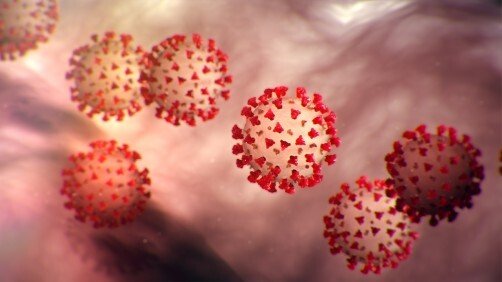A new article by Columbia Mailman School of Public Health researchers Jeffrey Shaman and Marta Galanti explores the potential for the COVID-19 virus to become endemic, a regular feature producing recurring outbreaks in humans. They identify crucial contributing factors, including the risk for reinfection, vaccine availability and efficacy, as well as potential seasonality and interactions with other viral infections that may modulate the transmission of the virus. The article appears in the journal Science.
Shaman is a professor of environmental health sciences and director of the Columbia Mailman School Climate and Health program and a leading authority in modeling infectious disease outbreaks like SARS-CoV-2 and influenza. He was among the first to recognize the importance of asymptomatic spread and the effectiveness of lockdown measures and published highly cited estimations of the hypothetic lives saved had lockdown occurred sooner. He and Galanti, a post-doctoral research scientist in Shaman's research group, also published research finding reinfections with endemic coronaviruses are not uncommon, even within a year of prior infection.
The new paper explores one potential scenario in which immunity to SARS-CoV-2, either through infection or a vaccine, diminishes within a year--a rate similar to that seen for the endemic betacoronavirus that causes mild respiratory illness. The result would be yearly outbreaks of COVID-19. On the other hand, if immunity to SARS-CoV-2 was longer, perhaps through protection provided by immune response to infection with other endemic coronaviruses, we might experience what would initially appear to be an elimination of COVID-19 followed by a resurgence after a few years. Other contributing factors include the availability and effectiveness of a vaccine and the innate seasonality of the virus.
"Should reinfection prove commonplace, and barring a highly effective vaccine delivered to most of the world's population, SARS-CoV-2 will likely settle into a pattern of endemicity," the authors write. "Whether reinfections will be commonplace, how often they will occur, how contagious re-infected individuals will be, and whether the risk of severe clinical outcomes changes with subsequent infection remain to be understood."
Reinfection
Among those who have been infected with COVID-19, serological studies indicate that most infections, regardless of severity, induce development of some SARS-CoV-2-specific antibodies. Yet it remains unclear whether those antibodies are themselves sufficient to provide long-term "sterilizing immunity" to prevent reinfection. For many viruses, insufficient immune response, waning immunity, or mutations that allow it to "escape" immune detection can undermine or circumvent immunity and allow subsequent reinfection, although a prior infection may provide partial immunity and reduce symptom severity.
Co-Infection
Immune response to SARS-CoV-2 may be affected by whether or not someone is currently or was recently infected with another virus. Many studies prior to the pandemic show that infection with one virus can provide short-term protection--about a week--against a second infection. Other studies confirm that simultaneous respiratory virus infections are not associated with increased disease severity. While some SARS-CoV-2 coinfections have been documented, including co-infections with influenza and respiratory syncytial virus, there is insufficient data to draw conclusions. At the population level, a significant seasonal influenza outbreak could strain hospitals already dealing with COVID-19.
Seasonality
Evidence suggests COVID-19 could be more transmissible during winter. Outside the tropics, many common respiratory viruses reemerge seasonally during particular times of the year. The endemic coronaviruses (OC43, HKU1, NL63, 229E) all exhibit seasonality in temperate regions similar to influenza. Similarly, environmental conditions may also modulate SARS-CoV-2 transmissibility--not enough to preclude transmission during the early stages of the pandemic when immunity is generally low but perhaps sufficient to favor recurring seasonal transmission during winter in temperate regions, similar to influenza, once immunity increases.
Source: Columbia Mailman School of Public Health

Be the first to comment on "Will SARS-CoV-2 Become Endemic?"